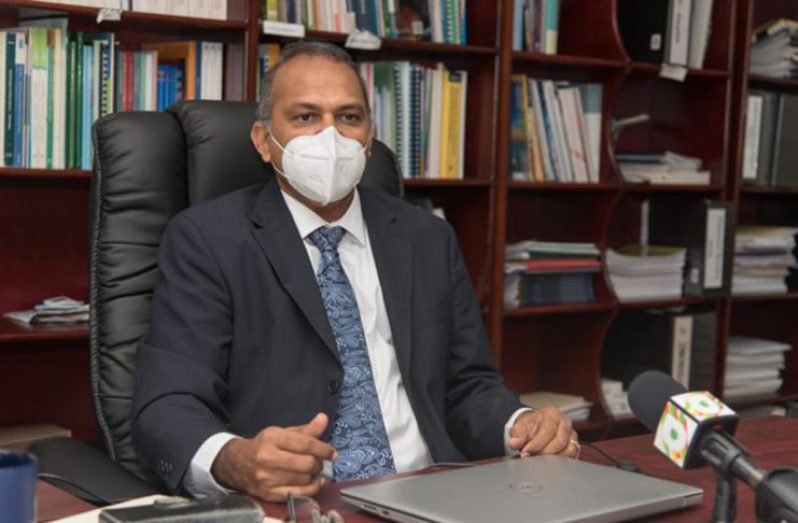By Navendra Seoraj
AS part of efforts to improve and increase testing for the novel coronavirus in hinterland communities, the authorities have sourced 20,000 antigen tests which will produce results within minutes.
Hinterland regions have been heavily impacted by the COVID-19 epidemic, with Regions One (Barima-Waini) recording 626 cases; Seven (Cuyuni-Mazaruni), 352 cases; Eight (Potaro-Siparuni), 127 cases; and Nine (Upper Takutu-Upper Essequibo) with 375 cases, accounting for over 38 per cent of the total cases in Guyana.
And as it is now testing for COVID-19 is done centrally at the National Reference Laboratory in Georgetown. Authorities would first have to acquire a sample from a person suspected to have COVID-19, then send the sample to Georgetown where medical professionals will conduct a Polymerase Chain Reaction (PCR) test, which takes hours to produce results.
“We have ordered the antigen tests. This is not the PCR test… it is done right at the site once you suspect COVID-19… you run the test and get it back within 45 minutes,” said Minister of Health Dr. Frank Anthony during a COVID-19 update on Wednesday.
According to the Centre for Disease Control (CDC), rapid antigen tests are commonly used in the diagnosis of respiratory pathogens, including influenza viruses and respiratory syncytial virus (RSV).
The U.S. Food and Drug Administration (FDA) has since granted emergency-use authorisation (EUA) for antigen tests that can identify SARS-CoV-2, the virus that causes COVID-19.
The centre said antigen tests are immunoassays that detect the presence of a specific viral antigen, which implies current viral infection.
Antigen tests are currently authorised to be performed on nasopharyngeal or nasal swab specimens placed directly into the assay’s extraction buffer or reagent.
NOT RESTRICTED

These antigen tests are not restricted to use on persons of a certain age.
“20,000 such tests have been ordered and hopefully we get them in November… the idea is to address the challenge of getting tests done… once we get them, we will deploy them and it will improve testing capacity in the region,” said Dr. Anthony.
Each hinterland community is already equipped with fixed sites for testing, but Minister Anthony said in cases where there is a high infection rate in a particular community, a mobile team will be deployed to conduct testing and contact tracing.
Minister Anthony said trained COVID-19 personnel are in every region collaborating on the clinical aspects of treatment, conducting contact tracing and environmental sanitation to ensure that the disease is being managed.
DETECING CASES
Detecting cases of COVID-19 in remote hinterland communities has, however, been a challenge for the Ministry of Health, but the ministry has since turned to toshaos and the Guyana Police Force to assist with contacting tracing.
“We have a difficulty tracking people in hinterland regions because some of them do not have telephones or a formal address, or any other form of contact information… to find them and make contact is difficult, but we have been working collaboratively with the police and toshaos to find those people and get them isolated,” said Chief Medical Officer (CMO), Dr. Narine Singh in an invited comment on Wednesday.
Considering the unavoidable challenges due to the remoteness of those communities, Dr. Singh advised persons in hinterland regions to adhere to the control measures, which also includes isolation once tested positive for COVID-19.
“We are trying to get community leaders to encourage persons to isolate themselves once they test positive for the disease or contact/visit a medical centre once you experience symptoms of the disease,” said the CMO.
It was reported recently that Guyana will soon have nationwide capacity to provide intensive care to persons who experience severe forms of COVID-19, as the country received $122M worth of ventilators and other equipment from India and the Pan American Health Organisation (PAHO) on Monday.
As it is now, the country has only one COVID-19 Intensive Care Unit (ICU), and this is located at the Georgetown Public Hospital Corporation (GPHC), but with the ‘timely’ donation, Guyana will be able to build its regional capacity.




.png)









